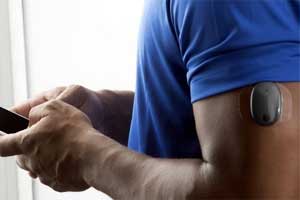- Home
- Editorial
- News
- Practice Guidelines
- Anesthesiology Guidelines
- Cancer Guidelines
- Cardiac Sciences Guidelines
- Critical Care Guidelines
- Dentistry Guidelines
- Dermatology Guidelines
- Diabetes and Endo Guidelines
- Diagnostics Guidelines
- ENT Guidelines
- Featured Practice Guidelines
- Gastroenterology Guidelines
- Geriatrics Guidelines
- Medicine Guidelines
- Nephrology Guidelines
- Neurosciences Guidelines
- Obs and Gynae Guidelines
- Ophthalmology Guidelines
- Orthopaedics Guidelines
- Paediatrics Guidelines
- Psychiatry Guidelines
- Pulmonology Guidelines
- Radiology Guidelines
- Surgery Guidelines
- Urology Guidelines
Blood sugar control in type 1 diabetes: Continuous glucose monitoring bests self-monitoring of blood glucose

Delhi: Continuous glucose monitoring bests self-monitoring of blood glucose in blood sugar and glycemic control in Type 1 diabetes patients regardless of insulin delivery method. Real-time continuous glucose monitoring (rtCGM) is what makes all the difference in improving blood sugar levels in people with type 1 diabetes (T1D) irrespective of whether insulin pump or multiple daily injections (MDI) of insulin are used, concludes 3 Years of Follow-Up From the COMISAIR Study. The study has been published in the journal Diabetes Care.
According to the study, rtCGM was superior to self-monitoring of blood glucose (SMBG) in reducing A1C, hypoglycemia in people with T1D regardless of the insulin delivery method.
In simpler words, rtCGM+MDI or, rtCGM with continuous subcutaneous insulin infusion (rtCGM+CSII) is superior to SMBG+MDI or SMBG+CSII for the management of type 1 diabetes.
Jan Šoupal, Charles University, Prague, Czech Republic, and colleagues assessed the clinical impact of four treatment strategies in adults T1D: rtCGM+MDI, (rtCGM+CSII), (SMBG+MDI), and (SMBG+CSII).
This 3-year trial followed 94 participants wioth type 1 diabetes (rtCGM+MDI, n = 22; rtCGM+CSII, n = 26; SMBG+MDI, n = 21; SMBG+CSII, n = 25).
The main end-points were changes in A1C, time in range (70–180 mg/dL [3.9–10 mmol/L]), time below range (<70 mg/dL [<3.9 mmol/L]), glycemic variability, and incidence of hypoglycemia.
Also Read: Blood sugar testing by CGM cost-effective compared to finger prick during T1 Diabetes Pregnancy
Key findings of the study include:
- At 3 years, the rtCGM groups (rtCGM+MDI and rtCGM+CSII) had significantly lower A1C (7.0% [53 mmol/mol] and 6.9% [52 mmol/mol]respectively), compared with the SMBG+CSII and SMBG+MDI groups (7.7% [61 mmol/mol], and 8.0% [64 mmol/mol], respectively), with no significant difference between the rtCGM groups.
- Significant improvements in the percentage of time in the range were observed only in the rtCGM subgroups (rtCGM+MDI, 48.7–69.0%; and rtCGM+CSII, 50.9–72.3%) and significant reductions in time below range (9.4–5.5%, and 9.0–5.3% respectively).
- Seven severe hypoglycemia episodes occurred: SMBG groups, n = 5; sensor-augmented insulin regimens (SAIR) groups, n = 2.
Also Read: CGM prevents extreme highs and lows of blood sugar in type 1 diabetes
"rtCGM+MDI can be considered an equivalent but a lower-cost alternative to sensor-augmented insulin pump therapy and superior to treatment with SMBG+MDI or SMBG+CSII therapy," concluded the authors.
To read the complete study log on to https://doi.org/10.2337/dc19-0888

Disclaimer: This site is primarily intended for healthcare professionals. Any content/information on this website does not replace the advice of medical and/or health professionals and should not be construed as medical/diagnostic advice/endorsement or prescription. Use of this site is subject to our terms of use, privacy policy, advertisement policy. © 2020 Minerva Medical Treatment Pvt Ltd